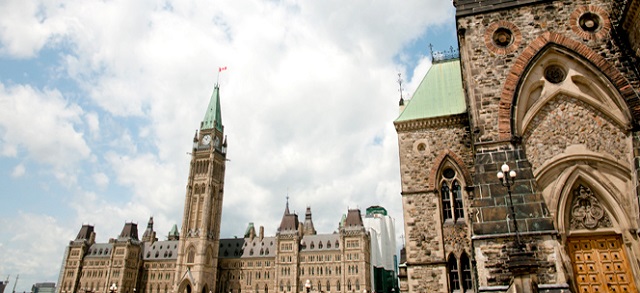Business
Justin Trudeau’s legacy—record-high spending and massive debt

From the Fraser Institute
By Jake Fuss and Grady Munro
On Monday, after weeks of turmoil and speculation, Prime Minister Justin Trudeau told Canadians he’ll resign after the Liberal Party choses a new leader. There will be much talk about Trudeau’s legacy, but the modern Trudeau era was distinguished—among other things—by unprecedented levels of government spending.
The numbers don’t lie.
For example, from 2018 to 2023 Justin Trudeau recorded the six-highest levels of spending (on a per-person basis, after adjusting for inflation) in Canadian history, even after excluding emergency spending during the pandemic. For context, that means the Trudeau government spent more per person during those six years than the federal government spent during the Great Depression, both world wars and the height of the Global Financial Crisis in 2008-09.
Unsurprisingly, the Trudeau government was unable to balance the budget during his nine years in power. After first being elected in 2015, Trudeau promised to balance the budget by 2019—then ran nine consecutive deficits including an astonishing $61.9 billion deficit for the 2023/24 fiscal year, the largest deficit of any year outside of COVID.
The result? Historically high levels of government debt compared to previous prime ministers. From 2020 to 2023, the government racked up the four highest years of total federal debt per person (inflation-adjusted) in Canadian history. Compared to 2014/15 (the last full year under Prime Minister Harper), federal debt per person had increased by $14,127 (as of 2023/24).
While a portion of this debt accumulation took place during the pandemic, a sizable chunk of federal COVID-related spending was wasteful. And federal debt increased significantly before, during and after the pandemic. In short, you can’t blame COVID for the Trudeau government’s wild spending and borrowing spree.
This fiscal record, marked by record-high levels, defines Prime Minister Trudeau’s fiscal legacy, which will burden Canadians for years to come. Spending-driven deficits and debt accumulation impose costs on Canadians—largely in the form of higher debt interest costs, which will hit $53.7 billion in 2024/25 or $1,301 per person. That’s more than all revenue collected via the federal GST.
And because government borrowing pushes the responsibility of paying for today’s spending into the future, today’s debt burden will fall disproportionately on younger generations of Canadians who will face higher taxes to finance today’s borrowing. And a growing tax burden (due to debt accumulation) can hurt future economic performance and the country’s ability to compete with other jurisdictions worldwide for business investment and high-skilled workers.
Under Trudeau, Canada has had an abysmal investment record. From 2014 to 2022 (the latest year of available data), inflation-adjusted total business investment (in plants, machinery, equipment and new technologies but excluding residential construction) in Canada declined by $34 billion. During the same period, after adjusting for inflation, business investment declined by $3,748 per worker—from $20,264 per worker in 2014 to $16,515 per worker in 2022. Due in part to Canada’s collapsing business investment, incomes and living standards have stagnated in recent years.
At the same time, Trudeau raised taxes on top-earners who help drive job-creation and prosperity across the income spectrum, and increased the tax burden on middle-class Canadians. Indeed, 86 per cent of middle-income Canadian families pay more in taxes than they did in 2015.
After approximately a decade in office, Prime Minister Justin Trudeau is stepping down. In his wake, he leaves behind a record of unprecedented spending, a mountain of debt, and higher taxes. It’s no wonder many Canadians are looking for change.
Business
Budget 2025 continues to balloon spending and debt

The Canadian Taxpayers Federation is criticizing Prime Minister Mark Carney for ballooning spending and debt in Budget 2025.
“Budget 2025 shows the debt continues to spiral out of control because spending continues to spiral out of control,” said Franco Terrazzano, CTF Federal Director. “Carney needs to reverse course to get debt and spending under control because every dollar Canadians pay in federal sales tax is already going to pay interest charges on the debt.
“Carney isn’t close to balancing anything when he’s borrowing tens of billions of dollars every year.”
The federal deficit will increase significantly this year to $78.3 billion. There is no plan to balance the budget and stop borrowing money. The federal debt will reach $1.35 trillion by the end of this year.
Debt interest charges will cost taxpayers $55.6 billion this year, which is more than the federal government will send to the provinces in health transfers ($54.7 billion) or collect through the GST ($54.4 billion).
Budget 2025 increases spending by $38 billion this year to $581 billion. Despite promises to control spending in future years, Budget 2025 projects that overall spending will continue to rise by billions every year.
“Canadians don’t need another plan to create a plan to meet about cutting spending, Canadians need real spending cuts now,” Terrazzano said. “The government always tells Canadians that it will go on a diet Monday, but Monday never comes.
“And the government isn’t really finding savings if it’s planning to keep increasing spending every year.”
Budget 2025 commits to “strengthening” the industrial carbon tax and “setting a multi-decade industrial carbon price trajectory that targets net zero by 2050.”
“Carney’s hidden carbon tax will make it harder for Canadian businesses to compete and will push Canadian entrepreneurs to set up shop south of the border,” Terrazzano said. “Carney should scrap all carbon taxes, cut spending and stop taking so much money from taxpayers.”
Business
Federal budget: Carney government posts largest deficit in Canadian history outside pandemic

-
Federal deficit projected to exceed $78 billion
-
This is Ottawa’s tenth consecutive unbalanced budget
-
Every newborn baby in Canada now enters the world with a debt of more than $33,000.
Repackaging record spending as “investments” while offering no credible path back to balance is the opposite of responsible fiscal stewardship, asserts the MEI in response to the tabling of the federal budget this afternoon.
“Canadians should find a deficit this large extremely troubling,” says Emmanuelle B. Faubert, economist at the MEI. “The attempt to disguise it under a new wave of so-called investments makes it even more concerning.
“It’s one thing to spend money you don’t have; it’s yet another to shirk responsibility for it.”
The Carney government is projecting a deficit of $78.3 billion for 2025-2026, up from $48.3 billion last year.
Interest payments are projected to rise to $55.6 billion this upcoming fiscal year, but servicing the debt will mount rapidly: to $76.1 billion by 2030, a 37 per cent spike.
Current debt charges cost taxpayers more than federal healthcare transfers to provinces, which amount to $54 billion annually.
This budget deficit would bring the national debt to $1.48 trillion, and mark the tenth consecutive year without a balanced federal budget. Every newborn baby in Canada now enters the world with a debt of more than $33,000.
Much of the new spending is categorized as capital as opposed to operational, which is a new reclassification scheme unveiled by the Carney government that does nothing to change the total debt. The government’s net debt is predicted to grow by another 21 per cent by 2030, to $1.79 trillion.
The Build Canada Homes program, for one, has an initial $13-billion price tag. The MEI studied a similar program launched in New Zealand, which accomplished just 3 per cent of its total objective.
The MEI warns that this marks a shift toward increased central planning, with Canada becoming an economy where politicians, instead of businesses and consumers, decide which industries succeed.
Overtures in the budget hint at a possible future walk-back of the emissions cap, which the think tank has strongly advocated for. In March, the PBO released a report estimating that the emissions cap would reduce our collective prosperity by $20.5 billion in 2032 and result in 40,300 fewer jobs than there would otherwise be.
A clearer path toward shrinking the federal bureaucracy has been laid out, with the government planning to eliminate 16,000 full-time positions, representing 4.5 per cent of the workforce as of March 2025.
Economist Emmanuelle B. Faubert would like the government to go further. While Ottawa plans to maintain the size of the federal bureaucracy at about 330,000 employees by 2028-29 through attrition, the MEI sees this as insufficient, and urged a more ambitious approach in its pre-budget submission.
The MEI recommended cutting the federal workforce by 17.4 per cent, mirroring the Chrétien-era reductions of the 1990s, which would eliminate roughly 64,000 positions and save taxpayers $10 billion annually.
The MEI welcomes the decision to expand capital cost allowances, letting businesses write off new machinery and equipment more quickly. This measure promotes investment and productivity by reducing the upfront cost of doing business.
“The government may try to rebrand its debt, but Canadians will still be the ones paying it off for decades,” says Ms. Faubert. “Carney calls it a generational budget, and he’s right, but only because future generations will be stuck footing the bill.”
* * *
The MEI is an independent public policy think tank with offices in Montreal, Ottawa, and Calgary. Through its publications, media appearances, and advisory services to policymakers, the MEI stimulates public policy debate and reforms based on sound economics and entrepreneurship.
-

 Aristotle Foundation2 days ago
Aristotle Foundation2 days agoB.C. government laid groundwork for turning private property into Aboriginal land
-

 Bruce Dowbiggin1 day ago
Bruce Dowbiggin1 day agoA Story So Good Not Even The Elbows Up Crew Could Ruin It
-

 Agriculture10 hours ago
Agriculture10 hours agoDanish Cows Collapsing Under Mandatory Methane-Reducing Additive
-

 Alberta1 day ago
Alberta1 day agoCanada’s heavy oil finds new fans as global demand rises
-

 Daily Caller22 hours ago
Daily Caller22 hours agoTrump Reportedly Planning Ground Troops, Drone Strikes On Cartels In Mexico
-

 Health1 day ago
Health1 day agoRFK Jr’s argument for studying efficacy of various vaccines
-

 Addictions1 day ago
Addictions1 day agoThe War on Commonsense Nicotine Regulation
-

 Business22 hours ago
Business22 hours agoTrump’s Tariffs Have Not Caused Economy To Collapse





